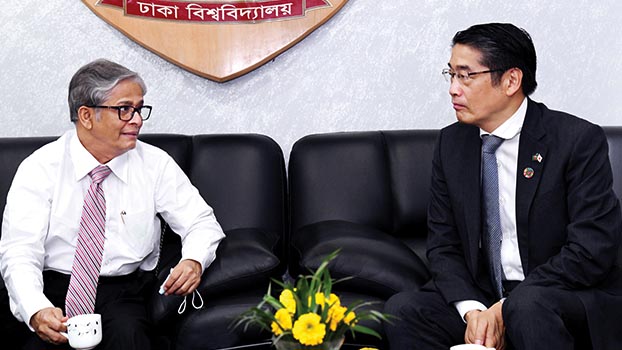‘Japan model best pathway to be a developed Bangladesh’

The speakers at the ‘JICA Chair’ seminar have said that Japanese model of development might be the “best pathway” for Bangladesh in achieving economic goals and turning itself into a developed country.
Japan’s experience in developing the country from the ashes of World War-II can be replicated in a customised version suitable for Bangladesh, they said.
The JICA Chair Seminar 2021 has been jointly organised by the Department of Japanese Studies, University of Dhaka, the Japan International Cooperation Agency (JICA) and the Embassy of Japan in Bangladesh.
The JICA Chair is a program that aims to contribute to development studies by sharing Japan's development experience.
Prof Dr. Md. Akhtaruzzaman, Vice Chancellor, University of Dhaka, was present as the chief guest at the programme with Japanese Ambassador Naoki Ito joined as the special guest.
Yuho Hayakawa, Chief Representative, JICA Bangladesh Office, also spoke at the event. Dr. Abdullah-Al-Mamun, Chairman, Department of Japanese Studies, chaired the seminar.
A special lecture titled ‘Policy Learning for Economic Growth and Industrial Transformation’ was delivered by Prof Dr. Kenichi Ohno of National Graduate Institute of Policy Studies (GRIPS) in the seminar.
He pointed out how to adopt the desired policy and implement them for rising economies like Bangladesh.
JICA Chair DVD Lecture 4 on ‘Economic Growth and Japanese Management’ by Professor Dr.
Hiroyuki Itami, President, International University of Japan has also been displayed at the beginning of the seminar.
Three discussants Professor Dr. Abul Barkat, Professor Dr. ABM Razaul Karim Faquire and Professor Dr. Delwar Hossain also delivered lectures on the occasion.
The vice-chancellor, Prof Akhtaruzzaman, said Japan is the “most trusted and largest bilateral partner” of Bangladesh which is contributing relentlessly to achieve SDGs and vision 2041—becoming a developed country.
He termed the seminar a “very pertinent” one to the Bangladesh government, policy makers and academia.
Ambassador Naoki Ito has mentioned that the collaborations between Bangladesh and Japan have reached a different dimension by the benchmark initiatives like Matarbari Mega Project, MRT Line, and expansion of HazratShahjalal International Airport.
He has also stressed upon higher degree of collaboration—not merely confined in infrastructural development but also expanded to joint venture research, sharing of knowledge in different fields as well as greater collaboration with academia.
The Chief Representative of JICA Bangladesh Office thanked all concerned including Department of Japanese Studies in making the seminar a success and mentioned that JICA Chair Seminar is just the new beginning of its support to Bangladesh.




